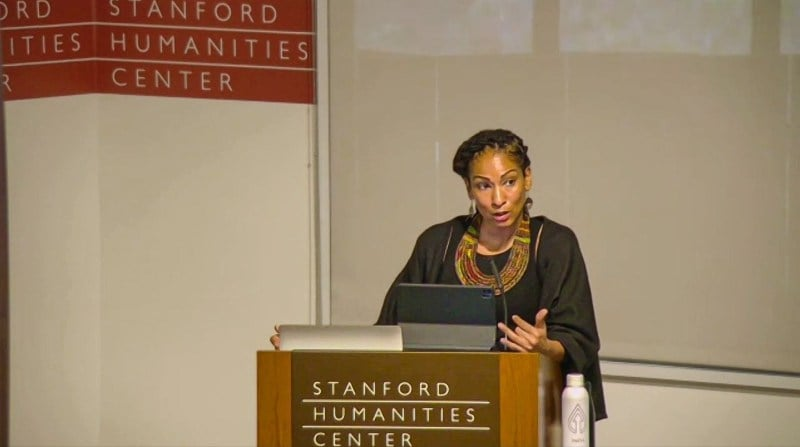In her compelling exploration of AI and social justice, Ruha Benjamin challenges us to reimagine the role of technology in shaping society. She argues that rather than succumbing to the dystopian narratives often woven by tech elites, we must envision a future where artificial intelligence promotes equity and positive change. Benjamin, a distinguished sociologist from Princeton University, criticizes the self-interested motives of billionaires who promise technological solutions while often perpetuating existing inequalities. By highlighting how AI, instead of being a neutral force for good, can exacerbate injustices—such as through biased algorithms and oppressive surveillance—Benjamin urges a reevaluation of our relationship with technology. Her advocacy for integrating AI ethics with social justice principles emphasizes the necessity of inclusive dialogue in the future of AI, and reminds us that we hold the power to redefine the technologies that shape our lived experiences.
When discussing the implications of AI within the context of societal equity, the work of Ruha Benjamin stands out as a beacon of thoughtful critique. She interrogates the intersection of technological advancement and social equity, suggesting that the narratives surrounding artificial intelligence are often crafted through a lens of elitism. Benjamin’s insights reveal that these advanced systems, touted as progress, may inadvertently deepen social divides rather than bridge them. This dialogue invites us to consider how innovations in technology can align with core values of social justice, and it compels us to rethink who gets to shape the future of these technologies. Her call for collaborative imagination challenges us to envision a society that prioritizes the well-being of all its members, moving beyond just technological efficiency to embrace a more just and equitable future.
Ruha Benjamin’s Vision for Social Justice in AI
Ruha Benjamin has emerged as a prominent voice in the intersection of AI and social justice, challenging the dominant narratives that often accompany technological advancements. In her presentations and writings, she articulates a vision of AI as not merely a tool of convenience but as a complex social artifact that can either perpetuate or dismantle systemic inequalities. Benjamin argues that the current frameworks for understanding AI must be expanded to include discussions around ethics, equity, and the historical context of marginalized communities, ensuring that the voices of those typically excluded from the tech space are heard.
By advocating for a deeper engagement with the ethical implications of artificial intelligence, Benjamin calls attention to the potential for technology to support social good. For instance, she has pointed out the troubling trend of technologies like facial recognition and automated decision-making systems being implemented without robust ethical oversight. These technologies can reinforce biases and lead to harmful outcomes for vulnerable populations. Thus, Benjamin’s work underscores the necessity of a critical lens on AI, pushing for reforms that prioritize social justice and address the flaws in data algorithms and their implementation.
The Role of AI Ethics in Building a Just Future
AI ethics is a critical field that examines the moral implications and responsibilities associated with technology development and deployment. As AI continues to integrate into various aspects of our lives, it becomes increasingly essential to consider how these systems impact society at large. Benjamin emphasizes that ethical considerations should not be an afterthought but rather a foundational aspect of technology design. This proactive approach advocates for creating inclusive policies that mitigate harms and promote equitable access to resources, reiterating that the future of AI is inherently tied to our societal values.
Exploring AI ethics invites critical questions regarding whose needs are prioritized in technological design. For example, the AI-driven surveillance systems that have been adopted in many urban environments often result in heightened policing and reduced privacy for marginalized groups. Benjamin’s argumentation aligns with the notion that ethical frameworks in AI should focus on community engagement and listen to those whom the technologies most impact. By fostering discussions around equitable technology, we can work toward a future where AI serves humanity positively rather than merely echoing existing power dynamics.
Creativity and Imagination in Rethinking AI
One of Benjamin’s most compelling arguments is the necessity of incorporating creativity and imagination into discussions about AI and its impact on society. By encouraging a shift from merely optimizing existing technologies to reimagining their purposes and potentials, she calls for a broader palette of ideas that originate from multiple disciplines, especially the arts and humanities. This interdisciplinary approach is vital in crafting innovations that enhance the collective well-being rather than perpetuating harm. Creativity can catalyze transformative ideas that challenge the status quo and illuminate new possibilities for societal development.
Reinvigorating creativity in the context of AI leads us to question not just the functionality of our technologies but also the values they embody. Benjamin’s insights inspire us to envision systems that prioritize human flourishing, equity, and ecological sustainability. This necessitates a supportive environment for thinking ‘outside the box’ and enables collaborative dialogue among technologists, artists, ethicists, and community members. By embracing this expansive mindset, we may discover paths that lead to more just and enriching futures, dismantling the narratives of dystopia often amplified by tech elites.
Challenges and Opportunities in AI Governance
The governance of AI technologies presents significant challenges, particularly as they intersect with social justice issues. As Ruha Benjamin notes, the rapid pace of AI development can outstrip the regulatory frameworks currently in place, leading to decisions that lack ethical consideration. This governance gap creates opportunities for harmful practices, such as surveillance or biased algorithm deployment, to flourish unchecked. Addressing these challenges requires a concerted effort among policymakers, technologists, and community advocates to establish robust frameworks that hold AI accountable to societal needs.
Yet, these challenges also present an opportunity to cultivate greater awareness and activism around the implications of AI. Many organizations and individuals are mobilizing to push for transparency and accountability in AI governance, advocating for clear ethical guidelines and public dialogue. By fostering a collaborative environment where diverse stakeholders contribute their perspectives, we can pave the way for a more equitable AI landscape. Ruha Benjamin’s work serves as a catalyst for these discussions, highlighting the importance of collective action against injustices perpetuated by technology.
Learning from History: The Legacy of Eugenics in AI
Ruha Benjamin draws parallels between AI technologies and past injustices, particularly the eugenics movement that sought to marginalize certain populations in the name of progress. This historical context is crucial for understanding how contemporary AI systems can perpetuate similar harms. As AI assumes an increasingly powerful role in decision-making processes, acknowledging the legacy of eugenics emphasizes the need for vigilance in preventing the reproduction of societal biases through algorithmic design. Benjamin argues that AI must not repeat the mistakes of the past, particularly if it aspires to be an agent of social justice.
By examining the implications of historical injustices such as eugenics, we gain insight into the ethical responsibilities that accompany AI innovations. This awareness encourages technologists and ethicists to actively engage with the societal impacts of the systems they create. Benjamin asserts that critical reflection on history can inform better practices in AI development, leading to more inclusive and equitable technologies. It is this historical consciousness that empowers us to challenge the narratives of inevitability surrounding AI and pursue systems conceived with justice at their core.
The Power of Interdisciplinary Collaboration in AI
Interdisciplinary collaboration is vital in addressing the multifaceted challenges posed by AI. Ruha Benjamin emphasizes the need for diverse perspectives in the technical development of AI to ensure that all voices, particularly those of marginalized groups, are represented. By involving experts from various fields, including sociology, psychology, the arts, and computer science, we can create a richer dialogue around the implications of AI technologies. This collaboration enhances the ability to innovate responsibly while being mindful of the ethical ramifications that technology can impose on society.
Moreover, fostering interdisciplinary partnerships allows for the exchange of ideas and methodologies that can lead to more effective solutions. For instance, insights from gender studies may reveal how AI affects different gender identities, while community organizing can highlight the social implications of certain technologies. These collaborative efforts can yield comprehensive frameworks for addressing complex social issues, ultimately leading to more just and equitable outcomes. Benjamin’s call for interdisciplinary engagement in AI dialogues urges a collective rethinking of how we shape our technological landscape.
Imagining a Technology Beyond Surveillance and Policing
In her explorations of the future of AI, Ruha Benjamin challenges us to envision technologies that transcend the conventional paradigms of surveillance and policing. She critiques the fascination with designing systems that primarily serve to maintain control rather than to promote civic engagement and community empowerment. By reimagining technology as a mechanism for positive social change rather than oppression, we can begin to conceptualize solutions that uplift marginalized communities rather than monitor them. This pivotal shift in perspective is essential for a truly equitable future.
Such a reimagined approach emphasizes the need to prioritize community needs and experiences in technology design. For instance, AI could be utilized to enhance public services like transportation, affordable housing, and healthcare access instead of reinforcing surveillance frameworks. Benjamin’s advocacy for creative inquiry underscores the belief that technology should foster human connection and collaboration, ultimately enhancing societal well-being. Her insights challenge us to think expansively about the purpose of technological innovation and to work towards a future that favors inclusivity over exclusion.
The Role of Education in Shaping Ethical AI
Education plays a crucial role in shaping the future discourse surrounding AI ethics and social justice. Ruha Benjamin urges institutions to prioritize the integration of ethical considerations in technology curricula, ensuring that future technologists are equipped with the knowledge and tools to address the societal impacts of their work. By fostering educational environments that encourage critical thinking and interdisciplinary collaboration, we can cultivate a new generation of leaders who prioritize ethical practices in the development of AI technologies.
Integrating discussions on social justice, diversity, and ethics into technology education can empower students to see beyond the technical aspects of AI. It emphasizes the importance of understanding the societal dynamics influenced by technological advancements. Educational institutions can be a breeding ground for innovative ideas that reimagine AI applications aligned with principles of equity and justice. By instilling these values in students from an early stage, we can pave the way for a more accountable and socially conscious tech industry.
Activism and Advocacy for Responsible AI Practices
Activism and advocacy are essential components in the effort to create more responsible AI practices aligned with social justice principles. Ruha Benjamin advocates for greater community engagement and activism to hold tech companies accountable for their AI systems. By fostering grassroots movements and public discourse around the implications of AI technologies, individuals and organizations can exert pressure on decision-makers to prioritize ethical practices. This collective action illuminates the need for transparency, accountability, and regulation in the tech industry.
Moreover, advocacy efforts should aim to elevate the voices of marginalized communities who are often most impacted by AI technologies. Engaging these communities in conversations about AI development can lead to more inclusive practices that directly address their needs. By emphasizing the importance of accountability, activists can challenge the status quo and drive significant changes in policy and practice within the tech sector. Benjamin’s work reinforces the essential nature of connecting activism with discussions around the future of AI, highlighting the potential for a fair and equitable technological landscape.
Frequently Asked Questions
How does Ruha Benjamin address the intersection of AI ethics and social justice?
Ruha Benjamin emphasizes that AI ethics must consider social justice, critiquing how technology often perpetuates existing societal inequalities. She argues that AI technologies marketed as efficient frequently lead to oppression, particularly of marginalized groups, urging a reexamination of our reliance on technical rather than social expertise.
What warnings does Ruha Benjamin give about the future of AI and social justice?
Ruha Benjamin warns that the future of AI could exacerbate injustices unless a critical focus on social justice is included in its development. She highlights the importance of balancing technological advancement with ethical considerations to avoid reinforcing systemic inequities.
In what ways does Ruha Benjamin suggest we can reimagine the future of AI?
Ruha Benjamin suggests that to reimagine the future of AI, we must prioritize creativity and imagination, moving beyond merely making current systems less harmful. She advocates for envisioning a world that transcends borders, policing, and surveillance, calling for an inclusive dialogue that integrates arts and humanities into the conversation around technology.
What role does Ruha Benjamin believe social dynamics play in the development of AI technologies?
Ruha Benjamin believes that social dynamics are crucial in the development of AI technologies. She argues that many tech solutions fail because their creators lack an understanding of societal needs, advocating for a collaborative approach that incorporates diverse perspectives to foster technology that truly serves the public good.
How does Ruha Benjamin critique the portrayal of AI as a morally neutral tool?
Ruha Benjamin critiques the portrayal of AI as a morally neutral tool by asserting that it often operates without considering the historical and social contexts affecting marginalized communities. She contends that decisions based solely on algorithms, devoid of ethical and emotional considerations, can perpetuate past injustices instead of alleviating them.
What is Ruha Benjamin’s vision for integrating arts and humanities into AI development?
Ruha Benjamin envisions integrating arts and humanities into AI development as essential for fostering innovative thinking and addressing ethical dilemmas. By prioritizing inquiry through these fields, she believes we can cultivate a more holistic understanding of technology’s impact on society, ultimately shaping a future that upholds social justice.
| Key Point | Explanation |
|---|---|
| Imagining a Different Future | Ruha Benjamin encourages citizens to envision a future that diverges from dystopian narratives, asserting that technology should serve humanity’s interests. |
| Critique of Tech Elites | She argues that tech CEOs often prioritize self-interest while claiming to promote altruistic goals, making them unreliable stewards of societal welfare. |
| Consequences of AI Technology | AI technologies are often marketed as efficient but can perpetuate oppression, as seen with issues in facial recognition and automated healthcare systems. |
| Moral Neutrality of Algorithms | AI is presented as neutral, yet Benjamin argues this disregard for social contexts can lead to harm for marginalized groups. |
| Redefining Knowledge | Benjamin advocates for the importance of integrating creativity, arts, and humanities into discussions about technology and innovation. |
| Invitation to Reimagine Society | She calls for a shift from restrictive thinking about technological solutions to a broader vision for a just society, free from oppression and inequality. |
Summary
Ruha Benjamin’s insights on AI and social justice challenge us to reconsider our approach to technology and its impact on society. As she eloquently illustrates, the future we envision does not have to be dystopian; instead, we have the opportunity to restructure our societal values away from the influence of tech elites. By advocating for a society that prioritizes creativity and human welfare over mere efficiency, Benjamin inspires us to imagine a world that transcends the limitations of current technological paradigms. Through her calls for imagination and inclusivity in shaping our collective future, we are urged to think critically and creatively about the role of AI in achieving social justice.



